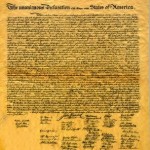Bereshit 5772 — We hold these truths to be self-evident
 “We hold these truths to be self-evident, that all men are created equal.”
“We hold these truths to be self-evident, that all men are created equal.”
Everyone knows the famous words that open America’s Declaration of Independence.
But are these truths self-evident? There have been civilizations, such as ancient Egypt, that believed certain people, such as their rulers, were gods.
This week we start again the annual cycle of reading the Torah. This week we again turn back to the beginning of the Torah and read about the creation of the world, the creation of Man, the expulsion from the Garden of Eden, the first murder.
And in these six chapters of the book of Genesis we find the basis for Judaism’s universal values, values that have transformed the world, values that will help us create a world of peace, love, and harmony. Values that daily inform the work of all human rights activists.
The key values are:
- We are all created in God’s image — there is a divine spark, a piece of God, within each and every one of us. “So God created man in His own image, in the image of God created He him; male and female He created them (Genesis 1:26).” We are all God’s children; we all have a “special” relationship with God. Each one of my five children is special to me, “chosen” in some way.
- We are all descended from Adam and Eve — a metaphorical tale that comes to teach us that we are all equal, no one can claim superior ancestry to anyone else. All the more so are we cousins with the “Ishmaelites,” the Muslims, with whom we Israelis are having such a struggle.
- Murder is a heinous crime, that destroys worlds. “What have you done? the voice of your brothers blood cries to me from the ground (Genesis 4:1).” The midrash points out that the word “blood” in the Hebrew is written in a plural form, as if it said “bloods.” The rabbis interpret this as meaning when you kill someone you destroy a world, not just the victim but the descendants that the person would have had if you had not killed him.
- We are responsible for each other; God asks Cain “where is your brother Abel?” and Cain replies “I don’t know; am I my brother’s keeper? (Genesis 4:9). Clearly in God’s eyes the answer would be “as a matter of fact, yes, you ARE your brother’s keeper.”
- God is compassionate, and we should be compassionate. Adam and Eve may get expelled from the Garden, but God also clothes them. Cain is punished for his sin in murdering his brother, but God also protects him from vigilante justice.

